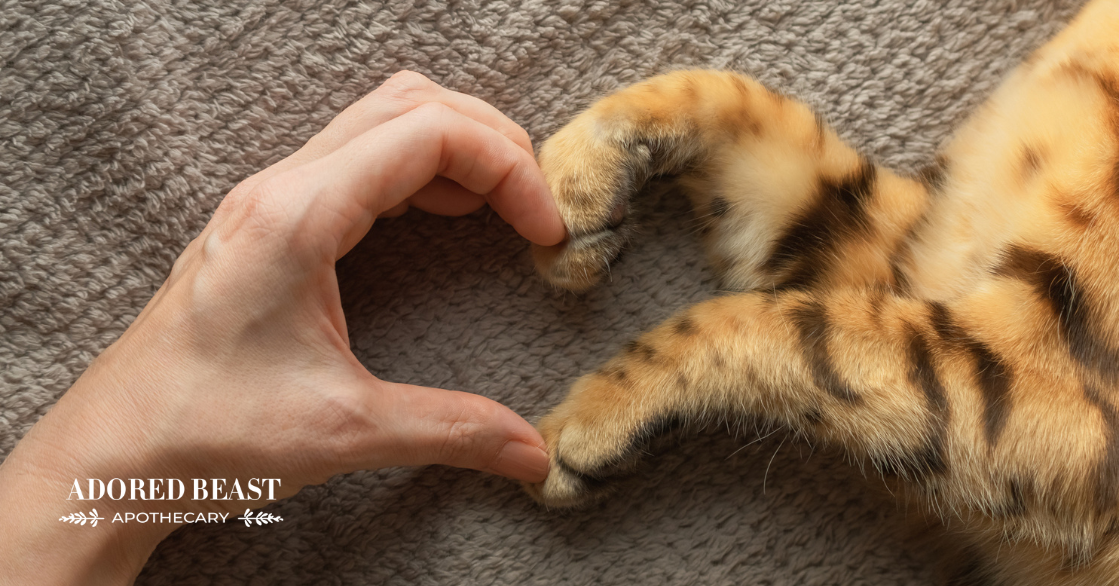We always want our adored beasts to be healthy. We feed them the best food, give them plenty of exercise, choose the highest-quality supplements, and shower them with lots of love. But sometimes, we can’t control certain elements of their health.
Hearing that your cat has a heart murmur can sound scary, but it’s not always a cause for panic. Some murmurs are harmless, while others may point to an underlying health condition that needs some attention. Understanding what a heart murmur is, what causes it, and how to support your cat can help you make the best decisions for their health and well-being.
What are Heart Murmurs in Cats?
A heart murmur is an abnormal sound your veterinarian hears when listening to your cat’s heart with a stethoscope. Normally, the heart makes a steady “lub-dub” sound as the valves open and close. A murmur sounds more like a “whooshing” or “swishing” noise, caused by turbulent blood flow in or around the heart.
Murmurs are graded on a scale from 1 to 6, with Grade 1 being very faint and Grade 6 being quite loud. A louder murmur doesn’t always mean a more serious problem, but the grading helps your veterinarian decide whether more testing is needed.
There are a few different reasons why your cat may have a heart murmur:
- Innocent or physiologic murmurs – These are soft murmurs often in young kittens and sometimes adult cats. They may disappear as the cat grows or remain without causing any harm.
- Underlying heart disease – This can include conditions like hypertrophic cardiomyopathy (HCM), the most common heart disease in cats. HCM causes the heart muscle to thicken, making it harder for the heart to pump blood efficiently.
- Anemia or hyperthyroidism – When the body is working harder than normal, blood flow can become more turbulent, leading to a murmur even if the heart itself is healthy.
- High blood pressure – Increased pressure in the blood vessels can create extra flow noise through the heart.
[RELATED] Dogs can have heart murmurs, too. Here’s how to support your canine companion.
Diagnosing a Heart Murmur
If your veterinarian hears a murmur, they may recommend further testing to determine whether it’s harmless or related to disease. Common diagnostic tools include:
- Chest X-rays
- Echocardiogram (ultrasound of the heart)
- Blood pressure measurement
- Blood tests to check for thyroid function or anemia
These tests help your vet understand how the heart is functioning and guide the best care plan for your cat.
How to Support a Cat with a Heart Murmur
The best way to support a cat with a heart murmur depends on the underlying cause. In many cases, you can address heart murmurs in cats with a little help from Mother Nature.
1. Address any underlying medical drivers (this is natural care, too)
- Check and treat hyperthyroidism – hyperthyroid cats commonly have fast heart rates and murmurs; treating the thyroid problem often improves heart signs.
- Screen for and control high blood pressure – hypertension (often secondary to kidney disease or hyperthyroidism) can produce murmurs and worsen cardiac remodelling; blood-pressure control helps protect the heart.
- Rule out anemia and correct nutrition – conditions like anemia or specific nutrient deficits (notably taurine historically) can contribute to heart disease; addressing these underlying issues is essential.
2. Omega-3 fatty acids (EPA/DHA)
- Why it’s considered: Omega-3s have anti-inflammatory, anti-arrhythmic, and antithrombotic effects that can be beneficial in heart disease. In cats with cardiac disease, omega-3 supplementation is commonly recommended as an adjunct because it may help reduce arrhythmia risk and platelet aggregation.
- Our Potent-Sea is a sustainably sourced omega that contains higher-than-average levels of EPA and DHA that doesn’t harm the oceans!
3. Natural supplements
- Coenzyme Q10: An antioxidant and cellular energy supporter in people and sometimes in veterinary practice; evidence in cats is limited but it’s used as adjunctive support for heart muscle energy.
- Hawthorn: An herbal cardiotonic used historically in people and sometimes recommended by integrative veterinarians for early heart disease.
- Dandelion: Dandelion leaves are a natural diuretic, so if your vet recommends a pharmaceutical diuretic, ask if you can try dandelion first instead.
- Antioxidants: Antioxidants have been shown to reduce heart disease risk, plus they protect the cells from free radical damage.
- Pre & Probiotics: Studies show there is a heart-gut axis: intestinal microbiota can affect cardiovascular health and vice versa. It’s important to encourage the growth of friendly bacteria in the gut to help protect the heart (and the whole body).
Key note: Many herbs and “human” supplements can interact with prescription heart medications (or be unsafe for cats). Always discuss these with your trusted veterinarian.
4. Environmental and lifestyle supports
- Reduce stress and provide predictable routines. Stress raises heart rate and blood pressure in cats; a calm environment, quiet resting spots, and gentle enrichment help lower cardiac workload.
- Gentle play and activity: Keep your cat active at a low to moderate level to maintain muscle mass and cardiovascular fitness, but avoid sudden intense exertion in cats with advanced disease. Tailor activity to your cat’s tolerance.
- Avoid temperature extremes and heavy handling that can spike heart rate and stress.
5. Prevent clot risk and complications
- Address clot risk with your vet. Cats with certain cardiomyopathies are at risk for arterial thromboembolism. Some clinics recommend dietary and supplement strategies to support circulation. Work with your vet to find the right ones.
When to Call Your Vet
Even if a murmur seems mild, it’s important to stay alert to changes in your cat’s behaviour. Contact your vet right away if you notice:
- Rapid or laboured breathing
- Lethargy or decreased activity
- Loss of appetite
- Fainting or collapsing episodes
- Sudden weight loss
These signs may indicate that the heart is struggling and your cat needs prompt care.
Heart murmurs in cats aren’t always bad news. Many cats live long, happy lives with murmurs. Some even require no treatment at all. The key is understanding what’s causing the murmur and finding ways to support your cat’s heart health. By staying informed, attentive, and proactive, you can help your cat live a comfortable and full life.












